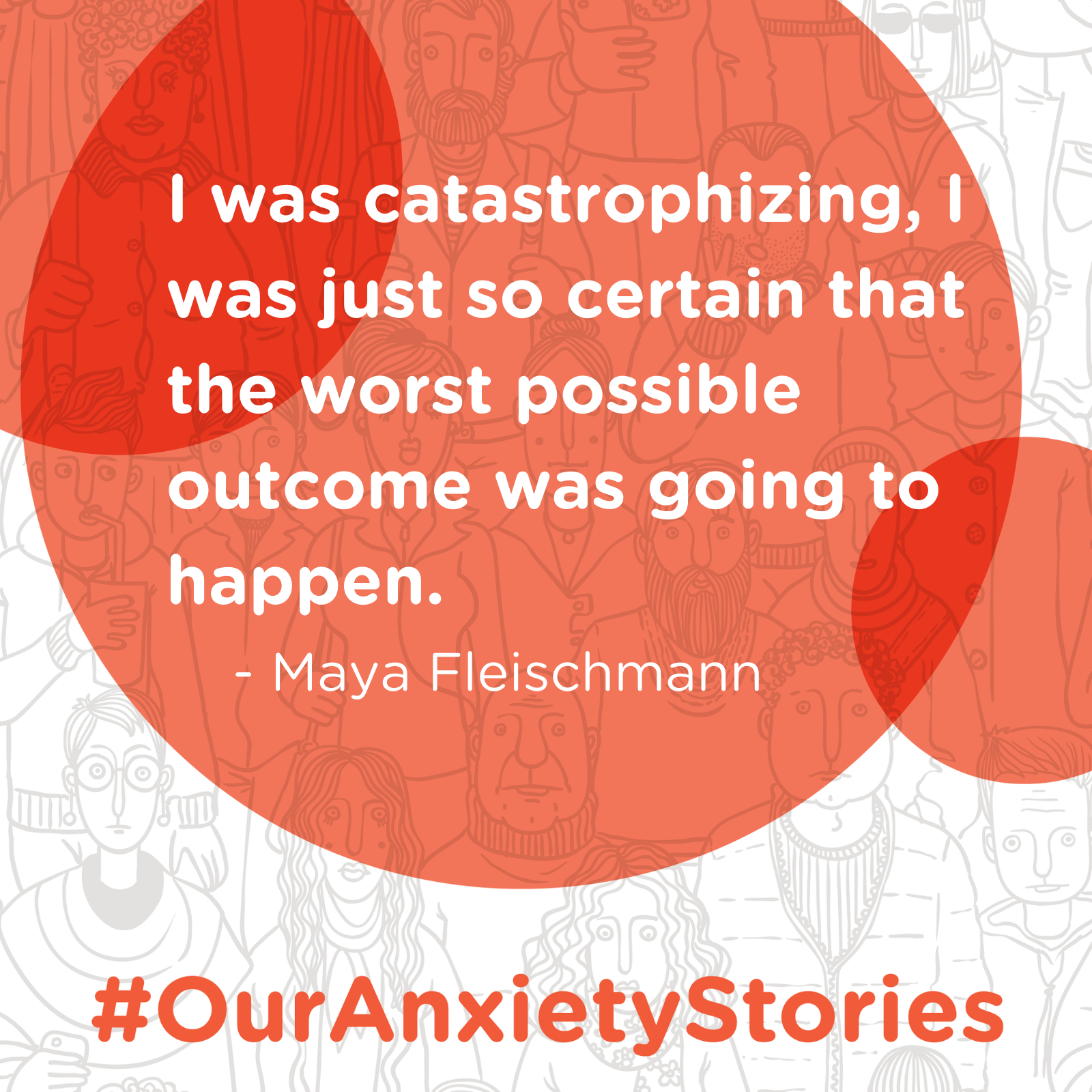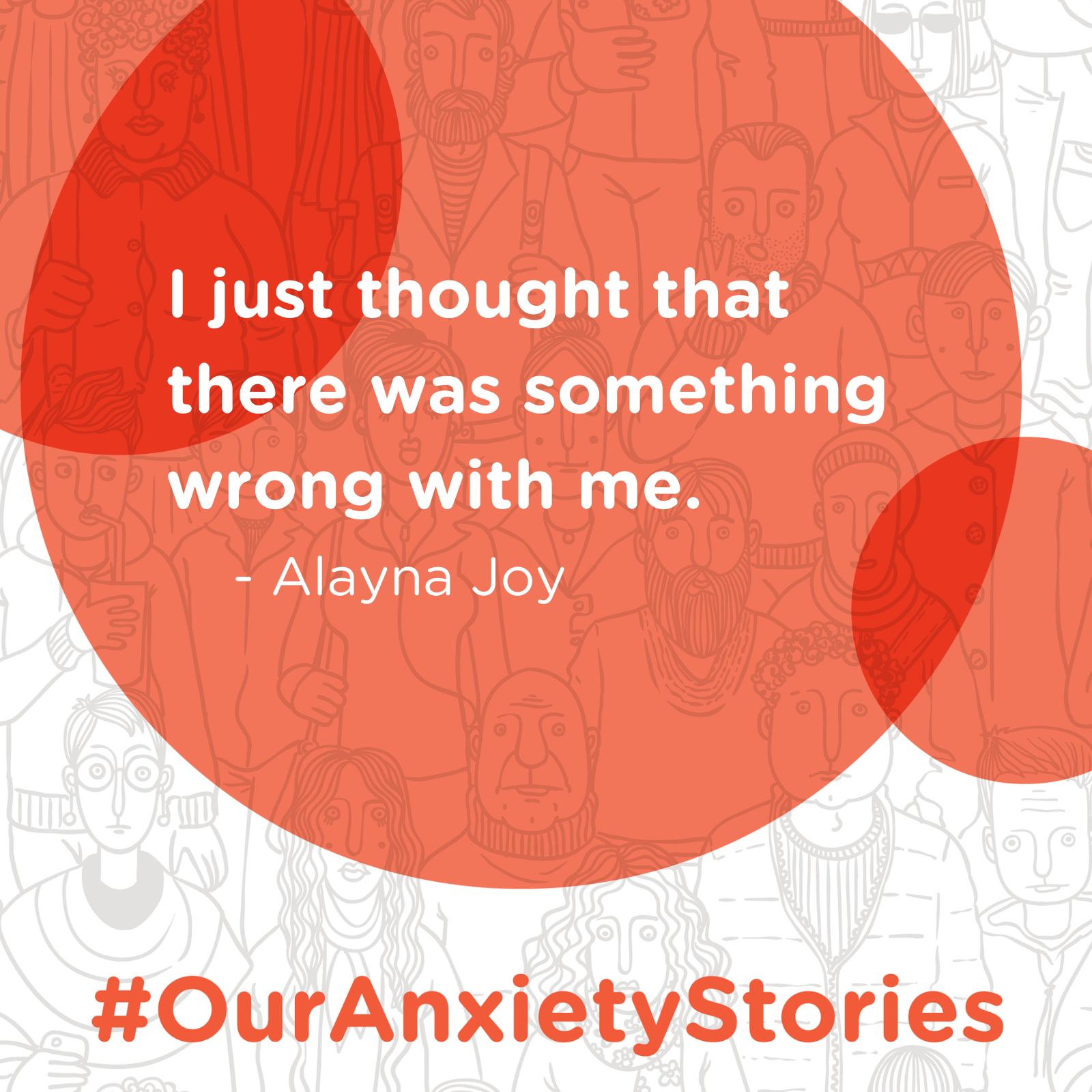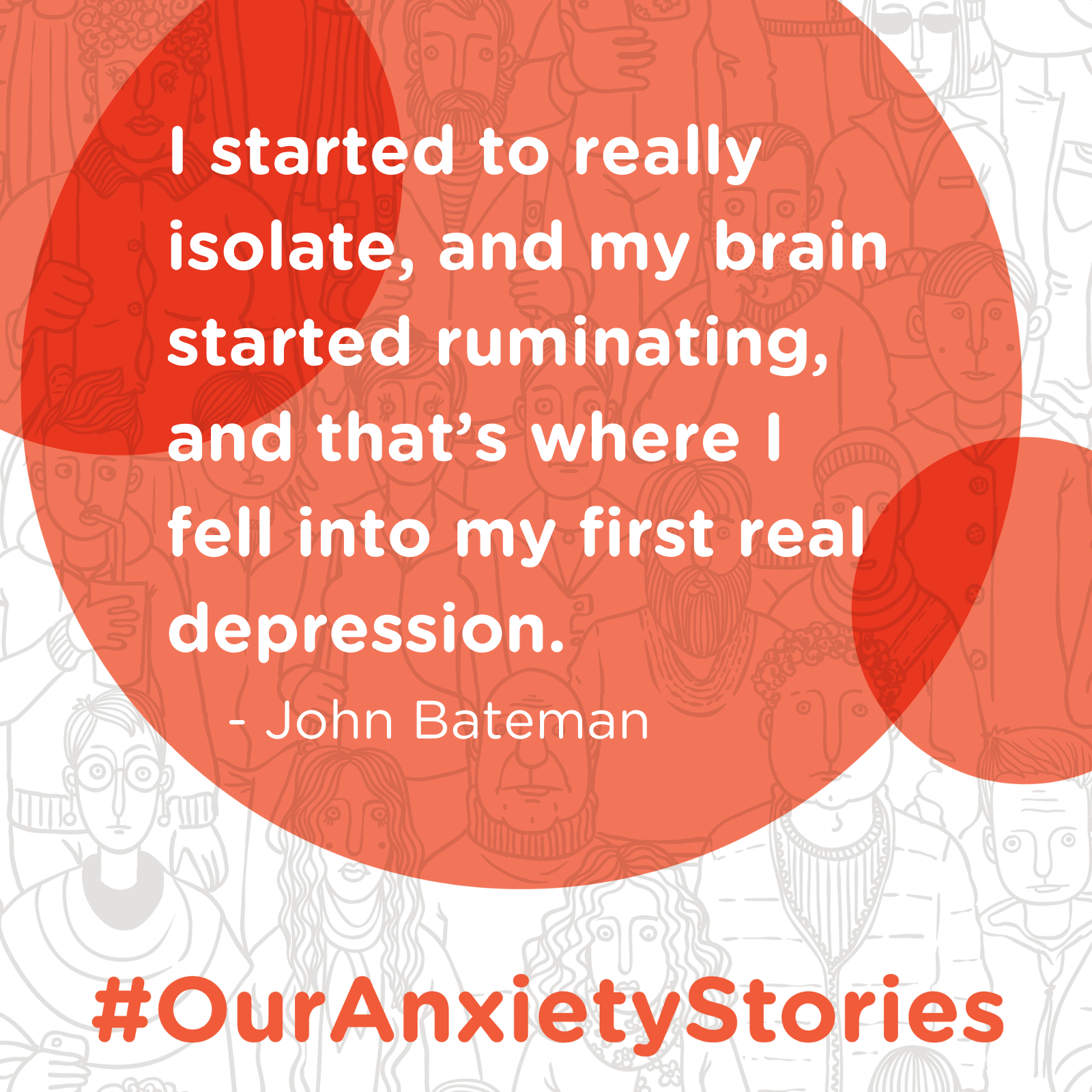Episode Transcript
Speaker 1 00:08 You are listening to our anxiety stories, the anxiety Canada podcast with Jon Beekman. Check out anxiety canada.com for more totally free anxiety resources, including our app mind shift at CBT,
Speaker 0 00:22 <inaudible>,
Speaker 2 00:25 podcaster and an actor. And I'm sure many other things that I don't know, but we'll maybe we'll find out. Uh, this is Brian McLean. Hi Brighty.
Speaker 3 00:33 Hi.
Speaker 2 00:34 I'm so glad that you got on. It was, it was, I was all my fault.
Speaker 3 00:40 Um, it's just a, it's a tough thing to coordinate schedules, but um, yes, there, there is a lot going.
Speaker 2 00:46 It is while you're, you, you must be super busy I guess.
Speaker 3 00:49 Well, today we went to camera on a new film, so, uh, yeah, it's been pretty busy leading up to it, but today, today is pretty smooth sailing so far.
Speaker 2 01:00 Oh, that's good. So you're like literally working on something right now.
Speaker 3 01:03 Yeah,
Speaker 2 01:03 yeah, yeah. But like, I mean, I kind of know you more through wealth or your sister. I kind of, I met you once through your sister Tara. Um, and, uh, and when I was setting up for this, I thought, you know, B, because I knew a little bit about, you know, talk to her a lot and knew a little bit about your history and, um, and your life. And I'm, I'm leading off the interview with the, with the basic question, which is the name of the show, which is what, you know, our anxiety story is, what's your anxiety story? What's your relationship? How has it affected you in your life?
Speaker 3 01:34 Um, that's a really big question.
Speaker 2 01:37 Yeah, it is. It is.
Speaker 3 01:39 I think I'd say the first, the first thing that comes to mind with that question is my first memory of anxiety and the, and it, you know, I grew up, I have very, I don't have a lot of complaints about my childhood or anything, but I, I grew up, um, in a, what they call a broken family, but I don't really think of it that way. But my, um, my dad and my stepmother raised me and my sister who, you know me through, um, she, she and I have the same mom so she was kind of on the other side of my family, not the family that I grew up with. And um, so probably when I was about eight, I would say I a tear on my sister and our other sister Shea, they came and they came for a visit to, to where I lived and they picked me up and we spent the day hanging out and it was great.
Speaker 3 02:30 And then they drove me home and I just remember this like stomach ache, this like deep, deep, like a, um, that, that just had me on my knees. I was so stressed, I was so stressed out and feeling so anxious just because of the dynamic and my family wasn't always really positive. So coming home with, with that side of my family to my, to my home, my family was, was a lot more conflict. I felt like that I couldn't handle in my, in my little eight year old body, but, but for, so for as long as I can remember, that's always how my anxiety has presented itself, isn't just like awful physical cramps, Krebs and my stomach and followed me and followed me in my whole life. No, I don't know if I wouldn't have known that if it wasn't for, um, my experience, um, practicing and teaching yoga over the last like 15, 10 years and, uh, and it really helped me identify like, what physical sensations are related to my anxiety.
Speaker 2 03:36 <inaudible> so you're, so yoga is one of your, it turned into one of your coping mechanisms.
Speaker 3 03:41 Yeah, definitely. Uh, it's like, uh, a peaceful break from, from things and, and slows the breasts and relaxes my body. And I, and I find that if I can, if I can control the physical aspects of my anxiety, it has a tremendous mental effect.
Speaker 2 04:01 That's, wow, that's amazing to hear that. I mean, that's a something we haven't really heard that, that angle before. Usually, you know, you're tackling the, the psyche right away, but the, the, the whole, uh, you know, kind of connecting it to your body and connecting those physical symptoms to your body and then addressing those can be a powerful thing too. <inaudible>
Speaker 3 04:19 yeah, absolutely. I mean it's similar to my acting training, right, where you can, you can create a, um, a psychological experience within yourself. Tap into emotions that are, that are not your own because the, they belong to the character, but you do it from the outside in. So you can do it from the, you know, using physical gestures and physical exercises to affect your psychology. And I've, I've used that in the same way cause because of course performing brings up a whole different kind of anxiety.
Speaker 2 04:54 Yeah. That's, so how do you, how do you differentiate those kinds of anxiety? Do you consider one anxiety to be more healthy or useful and the other obviously to not be healthy, new, useful. How do you differentiate between those two?
Speaker 3 05:05 I don't necessarily think either of them are healthy or useful. Like I, I, you know, I've been an actor for a long time and I, and I feel like I haven't really made my peace with it yet. Um, I, I'm, I'm always, every single time, the entire time being confronted with that impostor syndrome of, you know, even though I have years of experience and training, like I'm not supposed to be here and I'm not, I'm not meeting people's expectations and et cetera. So, you know, it's weird because then as a podcast or where I'm standing up on stage or on the microphone and presenting myself, I feel none of that feel very free.
Speaker 2 05:47 Is that right? Because your podcast is very different. Your podcast is called turn me on. Yeah. Yeah. And tell me the gist of what that podcast is about.
Speaker 3 05:56 That is about
Speaker 2 05:58 what it's like to be a sexual being in the world. Um, so my husband and I, we interview everyday ordinary folks about their experience and sometimes we get some really wild stories and sometimes they're, they're pretty, they're much more relatable, but we're pretty open about our experience. Um, we see other people and so we have lots of experience to draw from and yeah. And we get, we get pretty personal. Yeah, yeah, for sure. And so obviously you, you came like was that a decision that you and your husband came to where you decided it was more comfortable to be open and transparent about it? Right.
Speaker 3 06:39 Yeah, I think so. I think there's, the older I get, the more I feel like there are certain patterns I've fallen into in my life that I didn't realize were choices. It just matched what was happening around me and the in the adults that I saw from everything from, you know, the trajectory of a career to the trajectory of a relationship. And so, yeah, I feel like I feel like being trying to fit into a shape that's not necessarily my shape is, um, yeah, it's, that's stressful.
Speaker 2 07:19 Yeah, for sure. And you found that kind of opening up and transparency was a good, a good way to deal with it. Freeing, as you say,
Speaker 3 07:26 really, really, when everything's on the table, like when everything's just wide open and transparent, then then it becomes just a lot easier to deal with. I think those feelings.
Speaker 2 07:39 Yeah. So your, your husband is Jeremy Sanders, who is Saunder sorry. He was uh, he did art attack and he has,
Speaker 3 07:48 yeah. <inaudible> was the name of it,
Speaker 2 07:49 if that would, it was okay. Thank you. Thank you for correcting me. And, and he's got a super popular podcast called sick boy. I'm talking about his dealing with cystic fibrosis. Uh, one of the questions that I wonder about is how, how is it dealing with that, that in your relationship, you know, cause for me that is, that is pure anxiety. Um, how, how I would deal with that because it's, uh, it's a difficult disease to live with, let alone being a person who commits to somebody who has it. Like how does that, how does that work for you? How do you deal with that?
Speaker 3 08:26 Um, you know, there is, it's like a low hum all the time, you know, cause cause he, he's coughing all the time and yeah. And so it's always, it's always really present, especially now with the podcast. Um, but you know, this might be a really weird thing to say, but I feel like maybe that relationship is a defense mechanism for me because when I just, when I was like making that transition from high school to my independent sort of adulthood, um, Sarah and I, we lost our other sister really unexpectedly and it, nothing could've shook me more. And that definitely sent me on a, on a numb, like a year of number of years of, of, of depth and discovery and stuff like that. And then when I met Jeremy, I think, I think there's something soothing to some part of my brain and that I at least know that this is probably how it's gonna happen and what it's probably gonna look like. And that might be a really strange thing to say, but I think that's, that's how I make sense of it.
Speaker 2 09:46 Yeah, for sure. And, I mean, you mentioned your sister Shea, who passed away in a car accident. Um, what, what was, um, you know, I mean to me also that that's a, I don't even know how somebody deals with that. Um, and in terms of how it affects you, you know, your mental health and so on and so forth, how did you, how did that, how did you feel like that effected your mental health? How did you, how do you, how did you come back from that if you come back from it?
Speaker 3 10:18 Yeah, I think I would say that, um, you know, right off the bat it was very reassuring that I wasn't the only one grieving the way that I was grieving. It was, it was my very first experience with that kind of grief. But my family really also, it kind of pulled us all closer. And I know sometimes that doesn't happen, but, um, we, I definitely took a, uh, a personal dive into, again, I was just 18 and just finding the world on my own. And so I definitely numbed my grief for a couple of years with the same sort of thing that from the outside might look like your average every day. It's 1920 year old. I smoked a lot of pot am I drank a lot of alcohol and it, it helped I thought. And then, and then one day I showed up to a yoga teacher training at 21 and I was like, I, I want to feel healthy.
Speaker 3 11:32 And that yoga training really challenged me in, in like my things that I believed to be true and challenged my, like the hardness that had kind of formed a little bit around my heart. And um, and I just haven't been to turn away from that sense. It's not, it's not easy. It's, it's absolutely maddening to be challenged like that on all your defense mechanisms. But um, yeah, yes. Hello. I think yoga helped bring me out of it. My, the love of my family, um, my acting training cause it gave me a way to process that kind of pain. Yeah.
Speaker 2 12:18 And, uh, yeah, I guess that that, I guess that kind of thing helps sort the brain a little bit too.
Speaker 3 12:23 Yeah. Yeah. I mean I think it's funny cause I think I, this might, maybe this isn't fair to say, but, but I think a lot of people who are drawn to yoga and who are drawn to acting have mental health stuff that they are kind of wanting to maybe look at or work with.
Speaker 2 12:46 D do you think that they always know that when they get into it?
Speaker 3 12:49 No. No, definitely not. And maybe some of them never do.
Speaker 2 12:53 Yeah, I, yeah, that's true. I mean, because, uh, you know, one of the comments that I always get because I'm, I'm supposed to be funny, I'm not like being overly funny in this podcast, but you know, the days is pretty young still. Um, but, uh, but yeah, it's, it's true. I mean, I've suffered from anxiety and I've had depression my whole life and uh, and I'm, and you know, we all use different ways, but there's something about that, about actors and humor and all that, that, that we kind of gravitate, gravitate towards that.
Speaker 3 13:20 Yeah. Yeah. The, the, the levity, the lightness is, is so important. So important to, to just, I guess take all those feelings and channel them in something.
Speaker 2 13:32 Yeah. Well, you sure find out who your friends are once they see the other side of that. Right.
Speaker 3 13:37 That's super true.
Speaker 2 13:38 Yeah. Um, what's, what's the name, what's the name of the project you're working on right now?
Speaker 3 13:43 Um, so we are shooting a dependent film on Prince Edward Island. It's a landmark moment or Prince Edward Island film making. Um, it's called a small fortune and it's a thriller about sound money. Yeah. And uh, and yeah, it's great. My mom and dad are in it. Sophia, Sarah's daughter. Yeah. It's a family affair.
Speaker 2 14:09 Excellent. That sounds great. Uh, Bridey I really appreciate you taking the time to talk to me. Okay. And good luck with the movie for the rest of the way.
Speaker 1 14:20 Thank you very much. We'll talk soon. Okay. Talk to you soon.
Speaker 0 14:23 Bye. Bye.
Speaker 1 14:26 Thanks for listening to our anxiety stories, the anxiety cat podcast with John Bateman, checkout anxiety canada.com for more anxiety resources, including our app Mindshift CBT. And if you like what you hear, please consider making a donation. This podcast is made possible by listeners like you. Until next time,
Speaker 0 14:45 <inaudible>.


